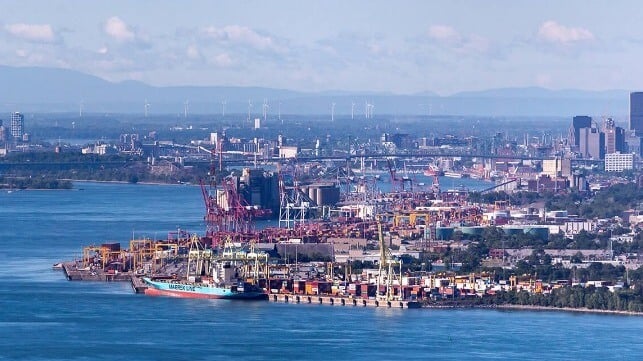Canada’s ports continue to struggle with labor disputes impacting both coasts and the potential to create disruptions and delays. Both disputes have been prolonged mirroring similar disputes that have developed at ports around the world as longshoremen and other workers address automation and demand recognition for their role in keeping supply chains moving during the pandemic.
Longshoremen in the Port of Montreal have been working without a contract for all of 2024, but after 35 mediation meetings over 15 months, the Maritime Employers Association (MEA) says “It is clear that the parties are still at square one and at an impasse.”
The Port of Montreal Longshoremen’s Union CUPE Local 375 filed its third strike notice on Thursday, October 24, informing the MEA and the Port of Montreal Association of its intent to hold a 24-hour strike. Approximately 1,200 members will stop work at 7:00 a.m. Sunday, October 27 with this strike set to impact all the port’s container terminals as well as the dry bulk operations. Liquid bulk and the grain terminals will again be excluded from the action.
At the end of September, approximately 300 dockworkers stopped work for three days at four of Montreal’s container terminals. This was followed by a ban on all overtime that started on October 10 and continues.
The MEA issued a statement saying, “These pressure tactics applied by the union have created significant operational problems, which are in addition to a number of obstacles that are seriously affecting stability and reliability at the Port of Montréal as well as in the Québec and Canadian supply chain.”
However, no clear path has emerged for resolving the dispute. Last week, Canada’s Minister of Labor and Seniors, Steven MacKinnon met with both sides and proposed a special mediator and a 90-day period. The offer was not accepted and has been withdrawn.
The MEA emphasized that the uncertainty is having an impact on the port and shippers. They contend that cargo handled in Montreal decreased by 24 percent since 2022 during a series of labor disputes. They believe that shippers have shifted cargo to U.S. ports.
The Montreal Port Authority issued a statement saying that it “remains concerned about the impact of pressure tactics on the logistics chain and on the supply of goods and commodities for businesses and the public.”
The union reports it will hold a “special general meeting” this Sunday. They did not reveal the purpose of the meeting but are urging members to attend.
At the same time, the Canada Industrial Relations Board issued a further decision this week on the ongoing dispute on the West Coast between the BC Maritime Employers Association and the International Longshore and Warehouse Union Local 514. The dispute is over the contract for 730 forepersons at the West Coast ports. The union’s contract expired on March 31, 2023.
The ILWU has attempted to strike against DP World but was blocked by CIRB. In the follow-up decision, the board continues to find that the union is bargaining in “bad faith.” They previously stopped a planned strike saying the union was attempting to isolate DP World. At issue are wages as well as work rules and changes planned as the ports increase automation.
CIRB found that the union was aware as early as August 2023 of the employers’ plans to use automated RMGs and the impact on work schedules. No bargaining proposal was made to the BCMEA however until April 2024. The board concluded, “that the union did not make every reasonable effort to reach a collective agreement.”
BCMEA reports that it is in touch with the Federal Mediation and Conciliation Service to discuss the next steps in the ongoing labor dispute. The union had previously taken a strike authorization vote but so far has not issued the required 72-hour notice.

